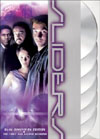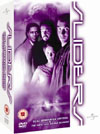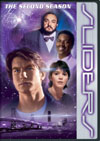The Good, the Bad, and the Wealthy
 |
|
 |
 |
Seasons 1 & 2
DVD Box Set
Region 1 NTSC




|
|
Seasons 1 & 2
DVD Box Set
Region 2 PAL


|
|
|
(Sliders Story No. 16, starring Jerry O'Connell)
- written by Scott Miller
- directed by Oscar Costo
- music by Anthony Marinelli
- produced by Tim Iacofano
(and Jon Povill, Tony Blake and Paul Jackson)
- Production # K0805
|
Story: The Sliders find themselves in a San Francisco
that is part of Greater Texas, where bizarre corporate laws
have merged with the code of the west, allowing for the rise of
gun-slinging "negotiators". Quinn's brash actions soon win him
a reputation as a fast-draw champion, attracting corporate suitors,
challengers, and locals begging for his help. Will Quinn continue
to play hero as expected, in a shootout with Texas' finest
at high noon?
|
|
DVD Extras include:
- Photo Gallery Montage (1 minute)
Buyers' Guide Review
by Martin Izsak
|
|
(A more in-depth analysis, containing "SPOILERS" and intended
for those who have already seen the program, can be accessed
here.)
|
This story has become a favourite primarily due to the very effective
way it showcases a "first" for Quinn's character development. To help prove
this point, we've gone through not only all the episodes preceding it in
broadcast order, but also all the episodes preceding it in what the
production codes suggest as the production order. This really is the first
ever story to give Quinn a heroic concluding moment that has nothing to
do with escaping into the next episode, and it does so pretty much
by taking him through the classic arc of the hero of a Western story,
complete with the build-up to a "High Noon" style climax.
True to form, or as a pinch from the classic Western "Shane",
Quinn's actions are all meant to be seen from the point of view of an
impressionable young boy, including his entrance out of the wormhole.
Though it looks at first as if the production is eager to do the
effect on the cheap,
it works this time by only showing us what the boy sees.
Fair enough.
The initial exploration of the world is decent enough, postulating
San Francisco as part of Greater Texas, and with radically different
corporate laws. There are probably some logic holes somewhere in
amongst everything that gets presented,
but it's intriguing enough to pull the audience along for the ride.
Quinn's actions in the bar are helped by consistency with what we've seen
him do in episodes like
"El Sid" and
"Greatfellas",
only this time it's taken to an extreme, and Quinn will have to
resolve it. For quite some time beginning here, the episode
looks as though it has probably de-railed itself,
with our would-be hero having done something atrociously unforgivable.
As admirable as Quinn's regrets are later on
(including the ones reported by Wade), he can't
quite claim the territory he truly wants to at this point, unlike
William Hartnell's Doctor in
"The Gunfighters" (Doctor Who story no. 25).
This derailing is largely fixed later on,
about 1/3 of the way through. While this is
immensely good, it still leaves at least two important questions....
which I won't even ask here.
Come back after you've seen the episode and read the
in-depth analysis version
of this review to find out what they are.
Billy Ray turns out to be an enjoyable character,
helping to sustain large sections of the middle of the show
with a stylish combination of wit, charm, and menace. Good one.
This story has an underlying half-implied tension running all the way
through it, making it a good example of the drama of a sinister organization
that will remain friendly with you as long as you don't try to leave.
We get a bit of that in the Charlie Sheen film "Wall Street", although
Tom Cruise's "The Firm" is a more solid and classic example.
Al Pacino's line from
"The Godfather, Part III" sums the dynamic up well:
"Just when I thought I was out, they pull me back in!"
Interestingly during this solidly Quinn-focused story, Arturo takes more
of a back-seat in this adventure than in any other we've seen yet,
which is also refreshing. Wade is quite vocal and makes a strong appearance
in this one, but is really little more than a walking opinion all the way
through.
Rembrandt at least gets a little side-plot to sink his teeth into during
the third quarter of the episode. Quinn did really good stuff with the cards
in "Greatfellas", but Rembrandt is even more enjoyable at poker in this
story. In terms of having easily understood motivations, Rembrandt's
plot is miles ahead, easily getting audience investment, and making it
easy to root for him.
But the best is saved for last, and saved for Quinn.
Without giving it away, we just want to say that it's even better than
what the rest of the episode may have led you to expect,
gets its philosophical values right, and satisfies mythological heroic
archetypes like never before on this show.
Neo and the Wachowski brothers can eat their hearts out;
Quinn's got the ending of the third Matrix film soundly beat here.
Awesome.
Well, this episode definitely does deliver some great stuff,
including something that we've been awaiting for far too long,
and for that it does deserve to sit amongst the season's best stories.
However, it's still not quite at the top of that list, since some of the
other adventures create and sustain cooler atmospheres all the way through,
with equally respectable endings.
This remains a key story, and a particularly enjoyable
and successful adventure. Nice achievement.
This story has become available on DVD.
Click on the Amazon symbol for the location nearest you
for pricing and availability:
 |
 |
 |
Seasons 1 & 2
DVD Box Set
Region 1 NTSC
for the North American market:

 in the U.S.
in the U.S.

 in Canada
in Canada
|
Seasons 1 & 2
DVD Box Set
Region 2 PAL

 for the U.K.
for the U.K.
|
Season 2
DVD Box Set
Region 1 NTSC - new for 2012
for the North American market:
 U.S. U.S.

 Canada 1 Canada 1

 Canada 2 Canada 2

|
Comments on this article are welcome. You may contact
the author from this page:
Contact page
|









